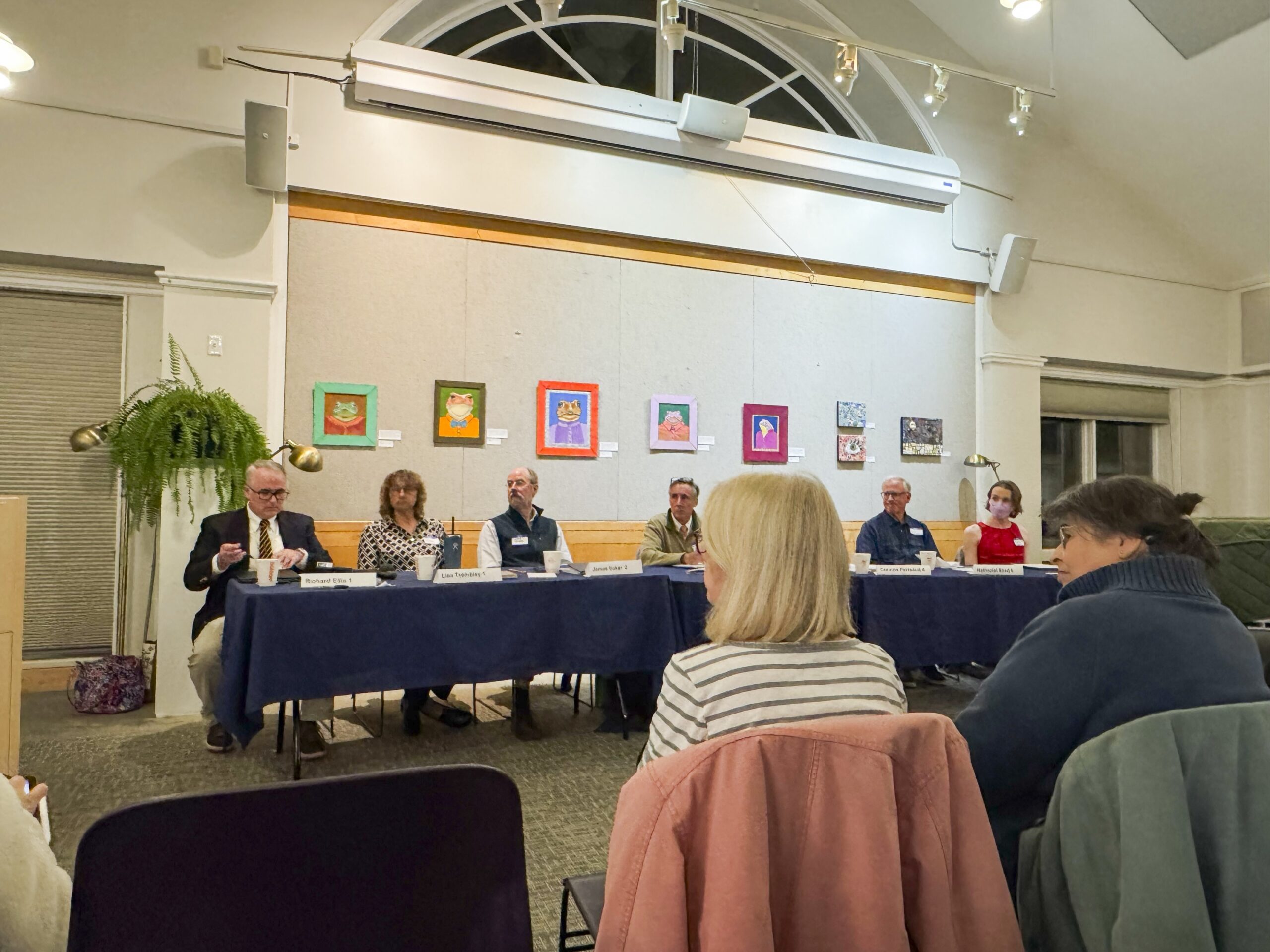Town Council candidates speak at Curtis Library
October 17, 2025
 Claire Shim
Claire ShimYesterday evening, community members came together in the Curtis Memorial Library to meet the candidates for Brunswick’s Town Council election. The election will be held on November 4, concurrently with Maine’s statewide election. This year, only four out of Brunswick’s seven Town Council seats are up for election, with the other three and two at-large seats absent from the November ballot.
Seven candidates are running across the four seats: Richard Ellis and Lisa Trombley in District 1; James W. Ecker for District 2; Corrine Perreault and Stephen S. Walker for District 4; Nathaniel R. Shed and Ramona Thieme for District 6. Current Town Council members Ecker and Shed are running for reelection.
The discussion began with a short introduction of all seven candidates, in which each of them emphasized their connections to the town of Brunswick, both as longtime residents and as involved members of the community. Additionally, the candidates shared what they believe the role of a town council entails.
The candidates then answered six predetermined questions, ranging from topics such as candidates’ priorities and financial plans, to the future of Brunswick and artificial intelligence (AI) usage in government.
When asked about their top priorities, all candidates emphasized issues including affordable housing, high residential taxes and improvements to fiscal responsibility through management of the town budget to lower dependence on property taxes.
“I think that the number one thing here is to improve affordability and the services to keep residents here in Brunswick and avoid their displacement. I think housing is certainly a huge part of that, and by that, I’m talking about rent stabilization and supply solutions for tenants, including those in mobile home parks but also increasing non-tax revenue for the town to reduce the tax burden for homeowners,” Thieme said.
Candidates had different approaches when it came to AI usage in the community. Some candidates, such as Ellis, emphasized AI’s utility while still cautioning that there should be guardrails established through policy, while other candidates were against its usage completely.
When it came to the protection of basic needs, including housing, food, health and safety, candidates expressed concern about the current Trump administration’s policy changes impacting the delivery of these services. However, candidates also emphasized that other things could fill this void, including relationships with local nonprofits as well as existing Brunswick committees, such as the social services committee.
Members of Bowdoin Votes, Bowdoin’s nonpartisan civic engagement program, also attended the forum. Ellen Salovaara ’26 spoke on the importance of Bowdoin student involvement in local elections.
“I think that while the town and school have a very good relationship, at least from what I know, it’s very easy for students to stay very insular on campus and not get out into the town, and I think that it’s just always been a nice breath of fresh air for me to get into town … [and remember] that Bowdoin isn’t just in this bubble, [but rather is] a school located within the town,” Salovaara said.
Bowdoin Votes is currently getting ready for the local election season, encouraging students to vote by postering, tabling and trying to make the election season as engaging as possible. Salovaara emphasized the importance of local elections, even for Bowdoin students, who may hesitate to get involved for the short time they live in Brunswick.
“I think it is important to remember that we are also setting up a town and a school that more people will be coming to … years and years after us, and we should [vote to] invest in the community, [and] if nothing else, then to invest in Bowdoin students,” Salovaara said. “[Students should also vote] to give back to the town community, and give back to the people who are less fortunate in the town and vote for people who are going to help people … on the margins of society.”
Regarding the future of Brunswick, many candidates expressed a desire to preserve what makes Brunswick special, while also accepting change and growth in certain areas. Multiple candidates also emphasized the importance of environmental sustainability in Brunswick.
“I recently came across this philosophy called being a good ancestor.… I think what we need to do is start thinking about meaningful town interventions for those things that the market forces and private sectors are not going to protect: our water quality, our forests, our access to the ocean, our coastal water quality,” Walker said. “Also, we need to take an active role in affordability. We can’t just rely on these public-private partnerships that are resulting in very limited results. In my opinion, we need to actively own the land, build the houses and make sure it’s long-term affordable.”

Comments
Before submitting a comment, please review our comment policy. Some key points from the policy: